Organizing Medical Papers
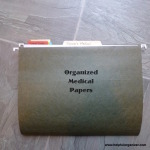 In preparation for visiting a new doctor last week, I realized that my medical papers were not organized in a manner that was suitable to my needs. They were mostly organized in chronological order of doctor visits, and I wanted them organized by subject, and then, in chronological order of doctor visits. So, I gave myself the project of organizing my medical papers.
In preparation for visiting a new doctor last week, I realized that my medical papers were not organized in a manner that was suitable to my needs. They were mostly organized in chronological order of doctor visits, and I wanted them organized by subject, and then, in chronological order of doctor visits. So, I gave myself the project of organizing my medical papers.
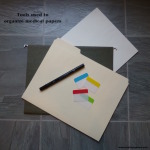 The tools I used were a hanging file, a file folder, 8 sheets of paper, 8 tabs, a highlighter, and a black marker. I first sorted all my medical papers into subject categories. I choose 8 different categories that made sense to me as I was sorting my papers. The 8 subject categories I used were general information, yearly physicals, mammograms, doctor visits, eyes, and 3 categories for specific ailments I have. Your medical categories may be slightly or completely different. That is understandable. Personalization is encouraged.
The tools I used were a hanging file, a file folder, 8 sheets of paper, 8 tabs, a highlighter, and a black marker. I first sorted all my medical papers into subject categories. I choose 8 different categories that made sense to me as I was sorting my papers. The 8 subject categories I used were general information, yearly physicals, mammograms, doctor visits, eyes, and 3 categories for specific ailments I have. Your medical categories may be slightly or completely different. That is understandable. Personalization is encouraged.
Here is a list of the types of papers I have in each subject category:
General information – primary care doctor contact information, office hours and locations, medical insurance documents
Yearly physicals – medical history records, physical exam results, lab results, appointment reminders
Mammograms – test results, appointment reminders, literature on subject
Doctor visits – test results, appointment receipts, insurance explanation of benefits
Eyes – appointment receipts, exam results, prescriptions, eye glass receipts
Specific ailments – test results, appointment receipts, diagnoses, prescriptions, literature on subject

I used the highlighter to mark the date and subject on specific papers. I used the tabs and paper to create dividers for each of my 8 subjects. I used the marker to write the subjects on the tabs. I placed all the tabs on the upper left hand side of the paper (horizontal) so they would fit into the file folder and be easier to read. It’s much easier to scan one area for the subject tab, then have to scan staggered tabs, especially since we read from left to right. I reduced as many papers as I could before reassembling my medical file. I shreded 56 papers that I felt comfortable discarding.
The project took me about an hour to complete. Since all of my papers were in one file folder and in a semi organized state, I was able to complete the project in a relativity short amount of time, but if you’re going to organize your medial papers and they’re in disarray you will need to give yourself more time to complete your project. You will also realize as you sort your medical papers that your subject categories will be specific to you. That is ideal. Each and everyone of us needs to find a way of organizing that is personally suitable to our individual needs.
© December 2014 Janine Cavanaugh, Certified Professional Organizer All rights reserved

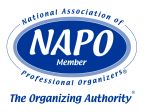
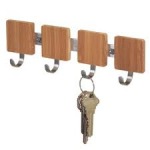



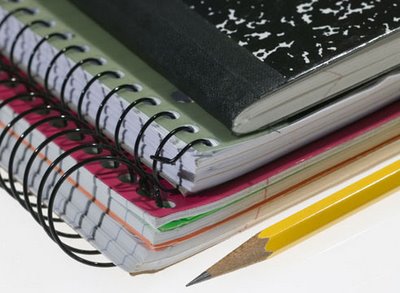
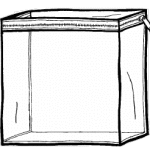

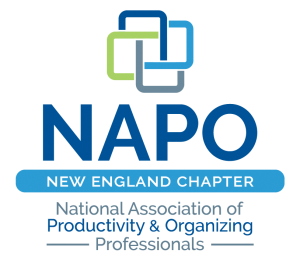
Follow Me